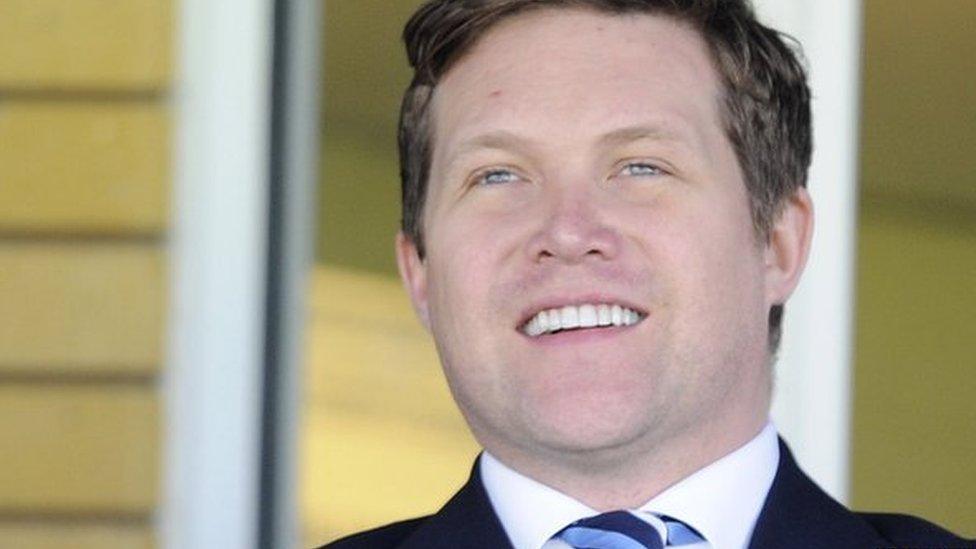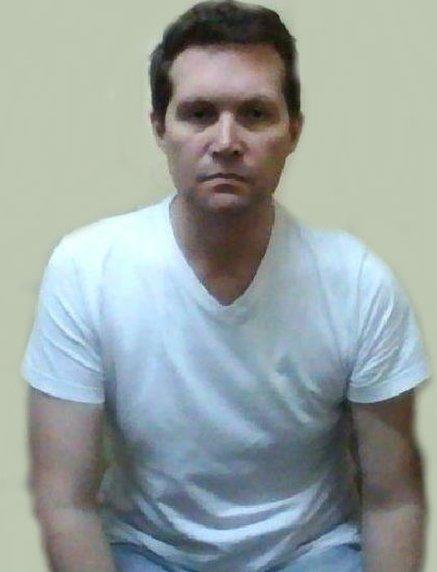British businessman detained for ‘Twitter abuse' in Dubai
- Published

An ex-football club executive accused of social media crimes in Dubai will have to spend Christmas in prison, after his case was adjourned until January.
Ex-Leeds United managing director David Haigh pleaded not guilty to cyber slander at a Dubai hearing on Monday.
Mr Haigh, 38, had been due to complete a two-year prison sentence in Dubai for financial misappropriation.
He says he could not have committed the alleged Twitter offence while in jail.
The authorities in Dubai and the investment bank at the centre of the social media complaint have both so far not commented on the matter.
The maximum penalty for cyber slander is three years in prison and a fine of up to £5,500.
The social media case was adjourned until 4 January. Mr Haigh's solicitor said his client will not seek bail as he is already under a sentence of deportation so would be considered a flight risk.

Photograph of David Haigh in prison
The Yorkshire-born solicitor and businessman had expected to return to the UK on 16 November, after serving 18 months behind bars.
He was originally arrested in Dubai on 18 May last year, when he was detained without charge for 14 months and had his worldwide assets frozen.
In August 2015, he was convicted of misappropriating items of monetary value from a position of trust from his former Dubai-based employer and sentenced to two years in prison - the majority of which he had already served.
Mr Haigh's lawyer says he is considering seeking a retrial of his criminal conviction.
The former vice-chairman of the Gulf Tories had said that after returning to the UK he would campaign for Britons unfairly imprisoned around the world.
'Scared and frightened'
The new complaint is from Mr Haigh's former employer, investment bank Gulf Finance House (GFH), and referred to remarks made on Twitter.
Mr Haigh was the deputy chief executive of GFH Capital Limited, a fully-owned subsidiary of GFH, before resigning on 10 March last year.
Mr Haigh strongly denies the latest allegations against him.
When contacted by the BBC, GFH Capital Limited declined to comment.
GFH is an investment bank headquartered in Bahrain with an office in Dubai that once owned Leeds United Football Club and continues to hold a 25% stake in the club.
Speaking to the BBC from his police cell last week, Mr Haigh said he felt scared, frightened and worried.
When asked if he sent the tweets in question from his @haighdavid account, he said: "Absolutely not. I was held in a jail in Dubai."
He insisted he did not have access to a computer.
Tweets on the account are written in the third person and the account description states it is "managed for ex Leeds Utd FC MD while he remains in a Dubai jail".

David Haigh is a former Leeds United managing director
Local authorities have so far not commented on the case despite repeated requests from the BBC.
Radha Stirling, chief executive of British-based group Detained in Dubai - which helps foreigners abroad - warned the UAE judicial system was still in development and the burden of proof on the complainant or prosecution, is quite low.
Ms Stirling told the BBC: "Without necessary safeguards in place, this legislation is open to abuse by disgruntled parties or parties who have an alternative agenda.
"This can render the respondent stuck in the UAE until the matter is resolved."
She said in some cases that could take months or even years.
The UAE government has reported that millions of tweets are sent in the UAE every day by hundreds of thousands of users.
Strict and wide-reaching guidelines prohibit the publication of content "which is contrary to public morals, the principles of Islam and the social and moral welfare of the UAE".
Cyber crime laws were introduced in the UAE in 2012 to make it an offence to use the internet to mock or deride organisations and individuals.
Ms Stirling said the new laws have increased the number of queries from Britons in relation to slander accusations by 150% in the past year.
In March, an expat American was jailed for comments he made on Facebook.
The British Foreign Office confirmed that Mr Haigh is still in Dubai.
A Foreign Office spokesman said: "We have been providing assistance to a British national detained in Dubai since May 2014, including regular visits to check on his welfare."